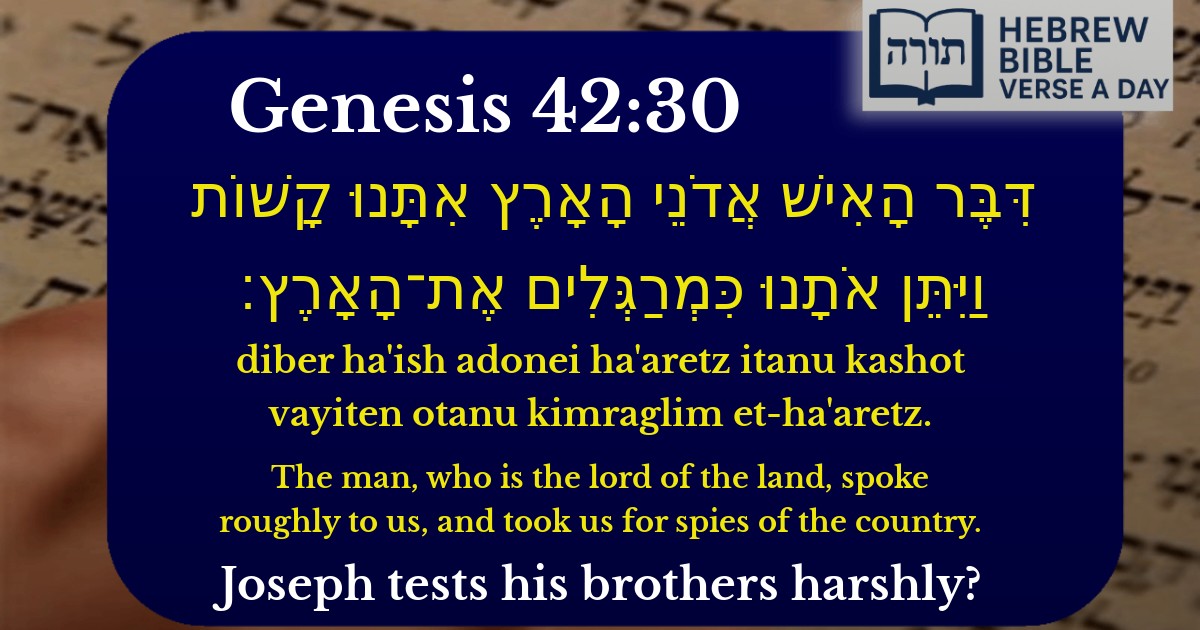Frequently Asked Questions
Q: Who is 'the man, the lord of the land' in Genesis 42:30?
A: In Genesis 42:30, 'the man, the lord of the land' refers to Yosef (Joseph), who was the viceroy of Egypt at the time. Though his brothers did not recognize him, he held great authority under Pharaoh (Rashi on Genesis 42:6).
Q: Why did Yosef speak harshly to his brothers in Genesis 42:30?
A: Yosef spoke harshly to his brothers to test them and see if they had repented for selling him into slavery years earlier. According to the Midrash (Bereshit Rabbah 91:7), Yosef wanted to observe whether they would stand united and show concern for Binyamin (Benjamin), their youngest brother.
Q: Why did Yosef accuse his brothers of being spies in Genesis 42:30?
A: Yosef accused his brothers of being spies to create a situation where they would have to bring Binyamin (Benjamin) down to Egypt. This allowed him to test their character and see if they would protect Binyamin, demonstrating their repentance (Ramban on Genesis 42:9).
Q: What lesson can we learn from Genesis 42:30 about family relationships?
A: Genesis 42:30 teaches the importance of repentance (teshuvah) and reconciliation in family relationships. Yosef tested his brothers to see if they had changed, showing that true repentance involves correcting past wrongs (Talmud, Yoma 86b).
Q: How does Genesis 42:30 connect to the broader story of Yosef and his brothers?
A: Genesis 42:30 is a key moment in the story of Yosef and his brothers, marking the beginning of their reconciliation. Yosef's harsh treatment was part of a divine plan to bring about repentance and reunite the family (Sforno on Genesis 42:9).


Context of the Verse
This verse (Bereshit 42:30) is part of the narrative in which Yosef's brothers recount their encounter with him in Egypt to their father Yaakov. Unbeknownst to them, the "lord of the land" (אֲדֹנֵי הָאָרֶץ) is their brother Yosef, whom they had sold into slavery years earlier. The brothers describe how Yosef treated them harshly and accused them of being spies.
Rashi's Commentary
Rashi explains that the brothers' description of Yosef speaking "roughly" (קָשׁוֹת) refers to his harsh interrogation. He notes that Yosef deliberately spoke to them in an accusatory manner to test their character and see if they would stand united in their response. Rashi also highlights that Yosef's actions were part of a divine plan to bring about repentance (תשובה) among the brothers for their earlier sin against him.
Rambam's Perspective
Rambam (Hilchot Teshuvah 2:1) discusses how divine providence orchestrates events to bring individuals to repentance. In this context, Yosef's harsh treatment of his brothers can be seen as a means to awaken their conscience regarding their past actions. The accusation of spying served as a catalyst for their introspection and eventual reconciliation.
Midrashic Insights
Ibn Ezra's Explanation
Ibn Ezra notes that the phrase "took us for spies" (וַיִּתֵּן אֹתָנוּ כִּמְרַגְּלִים) reflects Yosef's strategic approach to test his brothers' honesty. By creating a scenario where they would need to prove their innocence, Yosef could observe whether they had changed since their earlier betrayal.
Halachic Implications
The Gemara (Chullin 92a) derives from this episode the principle that one should not judge others hastily. Yosef's brothers initially misjudged him as a harsh ruler, unaware of his true intentions. This teaches the importance of giving others the benefit of the doubt (דן לכף זכות).